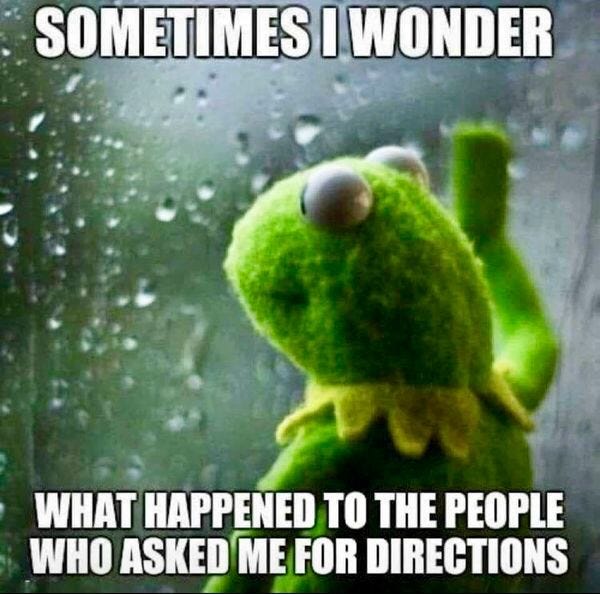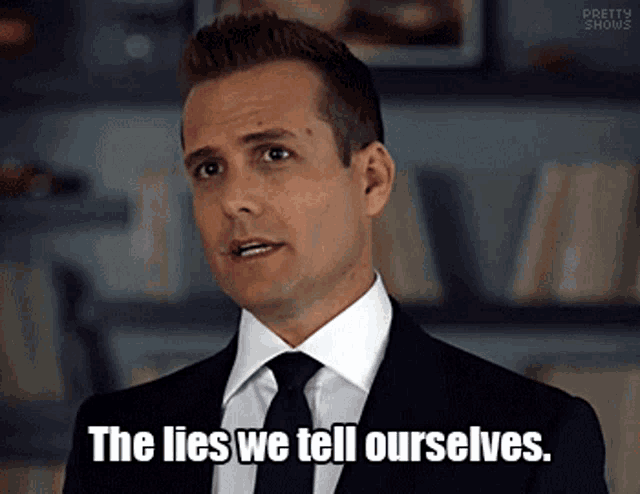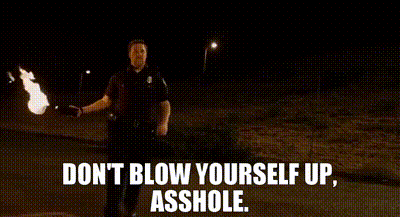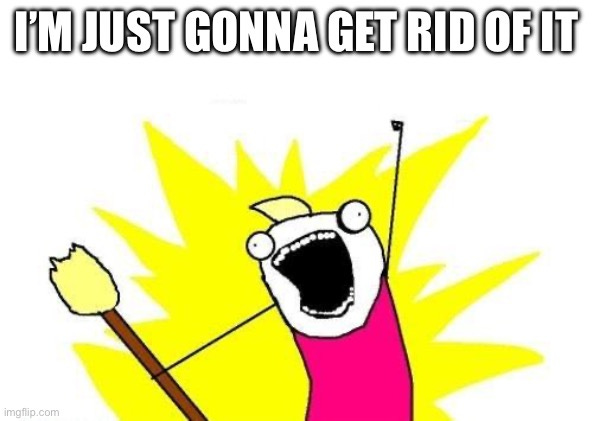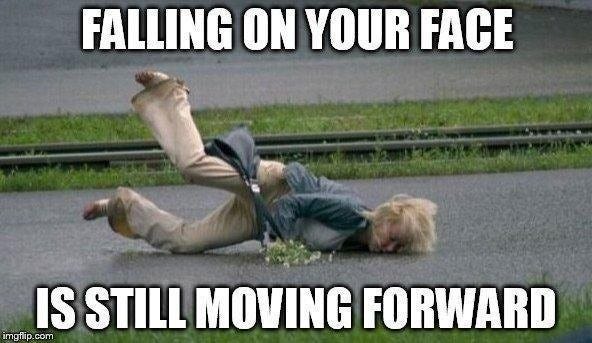It's time to put on your dala glasses
We're gonna make this fun!
But serious ...
BUT FUN!!
But Serious.
BUT FUNNNNN!!!!!!!
Seriously though, this subject is important, yet I believe it's useful to lighten up - if we take this too seriously, we're just gonna end up feeling bad about ourselves.
After all,
I'm about to ask you a simple question.
Are You Acting Like An A-Hole To Yourself?
just a minute
just a minute ...
Note,
I said to yourself.
Dala is "Directions for Acting Like an Adult" or "Don't Act Like an A-Hole"
But the only person this matters to is yourself.
It's all you today.
You and yourself.
Or if you prefer to get a little crazy, you can have a discussion between Me Myself and I.
What You Say and What You Do
In the most fundamental way, DALA means this:
When what you say and what you do are in alignment, you are acting like an adult.
When what you say and what you do are NOT in alignment, you are acting like an a-hole.
If you'd like to see our principled view on DALA1, check out our original article here:
Today we're going to explore some ways to stop acting like an a-hole and get yourself in order.
How does Acting Like An Adult look?
An example. From your desire to be more present and spend more time with your kids, you say:
"When I'm home and done with work, I'm going to put my phone away and not look at it so that I can make sure I'm more present with my kids in the time I have."
Note: specificity, doing less, alignment of action.
Why that specificity?
Trackable measurable action. You said you'd put your phone away and not look at it. Did you do that?
Why doing less?
It's easier to remove than it is to add.
Why alignment between specific words and actions?
Because that's acting like an adult.
If you fail to have that alignment, if you fail to do what you say, or say what you do, that's acting like an a-hole.
If you feel confronted and shamed by that - don't be.
Acting like an adult also includes acknowledging the full truth of when you are NOT. Only by walking that path can you affect the change necessary to have the behavior and outcome you desire.
We're not infallibly perfect people. There are times when we put our foot on the break and the gas at the same time. The skill and mastery is in acknowledging it and moving past it sooner.
It's not about judgement. It's about honesty.
You need that honesty in order to get what you really want in life.
But more on that soon.
A World of Expectations
There's external expectation. There's internal expectation. And then there's the actions you actually take.
What we care about,
Is your own internal expectation, what you say about yourself and what you're going to do, and what you actually end up doing.
Why is this important?
Because when you say "what I care about is spending more time with my kids" and then you make decisions that lead to you spending *less* time with your kids ...
There's a major gap there in yourself.
A dissonance which not only causes internal problems for yourself but creates a scenario where it's very difficult to actually get what you want in life.
Actions that take you away from what you say you want, OR lies to yourself about what you really want.
How can you be living the life you desire - getting what you want in life, if you're saying you want one thing but acting counter to what you say you desire?
Where DALA Problems Come From
Conflict between internal and external expectations.
Your internal expectations are complicated, and made all the more difficult to figure out if you are not clear on yourself, who you are, and what you really want in life.
It's easy to allow external expectations to influence our internal expectations, and then that leads us down a really confusing path.
An external expectation can be, "I should work more" driven by a desire to appear busy, studious, productive, etc. You can't actually lie to yourself about how productive you are being, or what you are accomplishing. So a lot of the times our idea "I should work more" is driven by the way we think other people are going to judge us.
"I should" ... anything really, is almost always driven by an external expectation.
Think about how the concept of "should" is applied. I should work out more, because other people work out more, because other people say working out more is the answer to my problems and what I desire.
When you look internally, the questions and ideas become different.
When it's an internally driven expectation, the thought isn't "I should work out more," it's more clear. I would like to be moving more than I am, and going to the gym to work out will solve that problem.
(You might still "should" yourself on that, and that's where the external and internal expectation mixes up and gets confusing)
I lay it out like this because I think it's useful to look at all the places where you say "I should do/be/have" and then ask yourself "where does that come from?"
Why it's useful to consider where your expectations come from is because they set the stage for being an a-hole to yourself.
"I should workout more", as an external expectation because other people work out more will lead you to say "I'm going to work out more" which can easily lead you to being an a-hole to yourself when you fail to work out more.
So.
Let's stop all that nonsense,
m'kay?
We're going to put on our DALA glasses today,
Look deeply and critically at ourselves, our lives, what we say, what we do, and walk through how to make sure we are acting like adults in order to get what we really want.
Sound good?
Let's do it ...
How to stop being an a-hole to yourself
Don't should yourself
I said this above, and we've talked about this before in TGA,
But it bears repeating because it's a really great "red flag" for tracking your own behavior.
Don't Should Yourself.
We should really make t-shirts.
(hah)
"Should" is the magic warning word.
If you are honest and serious about your own internal behavior and expectation, you don't ever measure yourself up against "should."
"Try Not. Do or Do Not. There is no try" - because within you, that's all there is. You either do something or you don't.
"Should" is based in expectation.
And who's expectation is that?
Start by changing the goal not the behavior
Most people, when they are confronted with the fact that what they say and what they do are not lining up with try to change their behavior to line up with what they say they want to be doing.
"I'm going to go to the gym 3 times per week for an hour each time."
Yet,
What you find yourself doing is at best only going once a week.
Most people will push themselves to change their behavior, to make sure they go 3 times per week because *that's what they said they were gonna do.*
STOP.
First do this.
If you are at most going once per week, start by saying this - "I'm going to try to go to the gym once per week, until I can consistently do once per week for 2 months and then I will try to increase."
Now what you are saying aligns far better with your behavior.
Acting. Like. An. Adult.
Does that feel like cheating? You don't have to change your behavior to act like an adult!
That's kind of the point.
It's not about the specific behavior.
It's about how clear and honest you are being with yourself and those around you.
The reason to change what you say and not what you do, is because that is the easiest most effective way to get in alignment and start acting like an adult.
Behavior is HARD to change.
Like,
Really damn hard.
Words are easy (which is why people lie to themselves all the time). You just have to accept that you aren't who you say you are, or not doing what you say you are doing. Hard for some, yet still far easier than changing your behavior.
Once your words and your behavior are in alignment, THEN you can start working on changing your behavior. Little bit by little bit.
What is enough to not be an a-hole?
This is another way to look at your situation.
What is enough, for me to not be an a-hole?
That's a broad question.
We talk about "what is enough" all the time.2
At the beginning when you're seeking alignment between your words and your actions, it may be enough to simply change what you say. But then you may decide that what you are saying and doing is not enough to match up to the life, results, outcome you desire from your situation.
But when in a state like this it can be easy to fall into the trap of trying to change the whole damn thing.
Going back to personal health and fitness, I'm going to pull from my life as example.
There was a time, when I lived by myself, had no one else relying on me. I had a very strict controlled diet. I lifted weights 3 times per week and I rode my bike 2-3 times per week in between. I had the time, energy, and space to do all that.
And I was in the best shape of my life.
Years later, much as changed. I have a family with several kids. I can't spend 10-15 hours a week between gym and bike riding. And when it comes to food, I don't have the same controls available (it's a whole 'nother conversation that I've figured out a better path for my personal nutrition anyway).
Here's the thing.
If (as an example), I'm not going to the gym at all, but I say I want to be going to the gym 3 times a week and doing the same exercises routine as before, I would be acting like an a-hole.
Lack of alignment between my words and my actions.
If I shift my words to match my behavior, I would be saying I'm not going to go to the gym. But now I have a problem, if I want to be more physical active. If I want to sit less. Etc.
That actually reveals a different disconnection between words and actions. My statement that I want to be physically healthy like someone who is regularly active, and I'm not being that person, now I need a plan to get there.
And it has to be a plan to get there, because I can't just suddenly be that person.
What is the DALA move?
It's not to suddenly try to force myself to go to the gym 3 times per week.
The DALA move is to figure out "what is enough" to set me down a path that will lead me to being physically healthy like I used to be.
The answer to that for each of us is personal.
Don't try to do the whole thing.
Trying to do the whole thing is how people blow themselves up and and then fail to get what they want in life.
Always ask,
What is Enough?
Here's a different example, not from fitness, but from writing.
Because I see this one quite a bit.
It's not uncommon for writers to say "I'm going to write 1000 words a day." Or other similar variations. The problem I have with these kinds of goals is that they are black and white successful, and do they really serve the end goal you actually have?
There's a question in there.
What is it you really want to achieve?
In the case of writing, does the specific word count matter?
If you write 500 words a day every day for a month, and you said you'd write 1000, you'd be putting yourself in a really bad spot!
Failure! Acting like an a-hole to yourself!
But hold on. If you wrote 500 words a day consistently, no matter what ... how could that be NOT beneficial to you as a writer?
While there is a disconnect between what you say you'll do and what you actually did, the problem in this case isn't between those two things ... the problem is misunderstanding what your actual goal is and not being clear with yourself.
Then failing to understand what is "enough" for you to achieve that goal.
You know what you can ALWAYS succeed at as a writer?
Writing any damn thing every day.
Even if it's 5 words. Even if it’s one.
Personally, I found when I took the word count off, and just told myself "no matter what, write, every day" I have created far more than I ever have before.
Can you be honest with yourself about what you really want?
And what is enough to make sure you're getting closer to that, rather than further away?
When the External Matters
DALA and alignment between your words and actions can get complicated.
For some people there IS meaningful external and internal obligation they must be meeting.
You may want to ask yourself:
Are there people who rely on me?
Am I on a team?
If there are people who depend upon you to do certain things, and you aren't doing those things, then changing your words will NOT be enough. It's certainly better to be honest about your status than to lie and pretend like you're going to show up for those who rely on you.
In which case, you either need to meet the needs of those who rely on you, OR you need to remove yourself completely from the equation, so that they no longer rely on you.
Be specific
"I'm going to work out more" is difficult to define and make sure you are not being an a-hole to yourself.
"As much as possible, given available time, I'm going to visit the gym once a week, to build up the habit of going once a week, so that I can then start working on twice a week, and then I'll consider a 3rd time."
This is a specific and manageable plan.
It also gives you space for the times when it does not work to go exactly once a week and still be in alignment with your behavior.
Remove, Don't Add
Now, if you don't LIKE how that pans out, you might start figuring out what things can be changed with certainty so that you can create a greater likelihood of being certain to make the gym once a week.
Perhaps that means putting it on a strict calendar, or moving other obligations or activities around to assure consistency.
But maybe going to the gym is not even necessary. Remember, what is enough?
Maybe instead of adding a new thing (like going to the gym), maybe you remove something that's in your way (like how much you are sitting). Maybe sitting less is enough to get started.
The point isn't to go straight for doing the new thing,
The point is to meet your own self where you are NOW, and instead of trying to immediately change your behavior by adding new stuff, eliminate the things which are getting in your way of doing what you ultimately want to be doing.
So, Put on Those Sexy DALA Glasses
Go through all the above.
Go through with clarity.
Go through with HONESTY.
It's just you and yourself here, no one else.
What do you say about yourself?
What do you say about what you want?
What do you say about what you do?
And
What are you actually doing?
Are you acting like an Adult?
If it's all dirty - that's great! See the dirt. See the problems. See the disconnect. Those are places you can focus to improve *right now today immediately.*
If you really want to get the things you desire in life with certainty, you need to start here. No matter how painful it is.
But,
It doesn't need to be painful.
It's all just the truth.
It's all just the way things are right here and now.
So be here with yourself, have fun with it, and then move forward.
Be Useful. Be Present. Love the Journey.
Joseph Robertson, CMO The Guardian Academy
Engage in discussion with the author and TGA+ Community in the comments below - give us your 6WU and/or thoughts after reading. Together we make a rising tide that lifts all ships.
Ready to apply your ideas to reality? You may find our Engage the Field Handbook a useful and effective resource.3
Get your hands on awesome unique swag and opportunities by sharing this article. We treat our ambassadors like royalty :)







